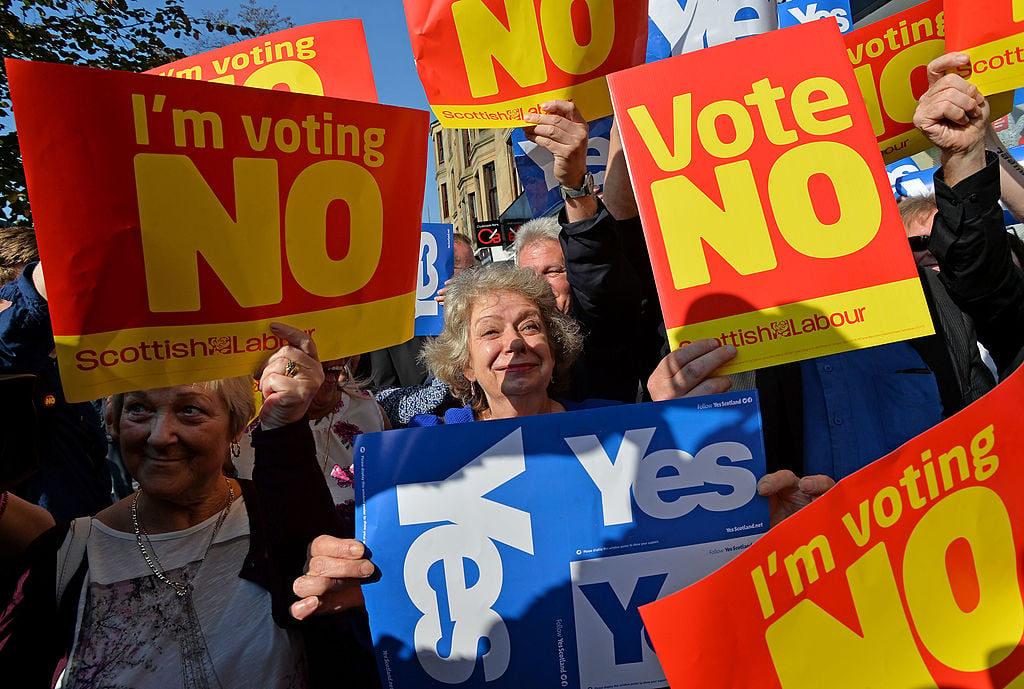
In less than two days millions of Scots will take to the polls to determine whether Scotland should become an independent state. It is a momentous decision: a staggering 97 percent of the constituency is registered to vote, making it the largest electorate for any election or referendum in the country.
Speculations on the outcome and its potential consequences have run wild in the last few weeks, particularly when the possibility of a ‘Yes’ victory really started to sink in. Scotland is a key part of the UK art scene, its light shining so bright it’s become difficult to distinguish which is benefiting more from the other. For starters, a large number of the UK’s most successful artists at the moment are Scottish. Jim Lambie, Karla Black, Lucy Skaer, Douglas Gordon, and Luke Fowler are just few of the names that spring to mind. Three of the four 2014 Turner Prize nominees are Glasgow School of Art graduates: Tris Vonna-Michell, Duncan Campbell, Ciara Phillips–the latter two now permanent Glasgow residents. And it is common for artists who move to Scotland to study to decide to stay there once their studies are over, attracted by its generous funding opportunities and strong artistic community.
Is this cliché a reality?
Artists had long been associated with the ‘Yes’ camp, which is seen as left-wing, but is this cliché a reality?
“When I first moved to Glasgow there was a definite feeling that a ‘No’ vote was inevitable, but there’s been a dramatic shift,” Sarah McCrory, director of Glasgow International festival, told artnet News. “I know a lot of artists who are voting ‘No’, but the ‘Yes’ camp seems bigger. I have no idea why, possibly because the promise of being away from the appalling current British government is so appealing, and, secondly, because the potential for change is tangible.”
“But the ‘Yes’ voters are outspoken and proud,” she continued, “while the ‘No’ voters are quieter about their decision, as there’s some feeling that it’s seen as ‘anti-Scottish’, so it is difficult to gauge.”
David Harding, the former head of GSA’s renown Sculpture & Environmental Art department, is fiercely pro-independence. “I am a ‘Yes’ voter,” he told artnet News. “The arts community, in great numbers, has supported independence for years. It argues that the vote is not about economics but about culture, and that culture will be here long after the oil has run out,” he continued, alluding to the contentious North Sea oil reserves.
Harding emphasized the strong sense of community that characterizes the Scottish art scene, an opinion that the art writer Isla Leaver-Yap, who recently returned to Glasgow after seven years in London and New York, shared but qualified:
“One could broadly say that the Scottish art scenes (because there is more than just ‘one’) largely operate without the local pressures of a commercial market, and this creates a different ecology than in, say, London, Paris, or New York,” she said. “This is not to say that Scotland is somehow utopic or more progressive; as recent surveys of artists’ income have shown, there are many artists, writers, and curators here working for abysmal pay.”
The National Collective is a group of artists and creatives that support Scottish independence
Photo via: the National Collective
Now, with the Royal Bank of Scotland and Lloyds Bank already warning that they would re-domicile their tax residency in London should Scotland become an independent state, not to mention the unresolved question of the currency union, how would a victory for independence impact the art market and, more generally, art funding?
Harding remained unfazed: “Independence will certainly bring about economic uncertainty but not anywhere near the uncertainty that hit the UK and the West following the crash of 2008. Independence in Scotland will not usher in anything so devastating. The few commercial galleries we have here operate internationally and I do not see them being affected in any way.”
A young Scottish artist on the up who asked to stay anonymous, said: “I get the impression that most people don’t think it will change arts funding too dramatically. The funding bodies are already quite separate—for example I can’t apply to Scottish funders as I am mostly based in London now.”
“No funding is ever stable,” concluded McCrory—whose GI festival receives public funding from bodies such as Glasgow Life, Creative Scotland, as well as from the British Council. “Whenever an election draws close, or there’s a change of governance, there is always the possibility that arts will be cut, or that certain arts will be more supported than others. There is a strong agenda to support the arts in Scotland and I would be surprised if it changed very dramatically. If Scotland won independence, however, and there was a national drive to cut funding overall, who knows? I would imagine we would lose the ability to apply to England-based trusts and foundations, but that’s just a speculation.”